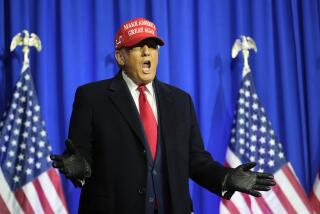Reagan Threatens to Veto Any Protectionist Trade Bills
SANTA BARBARA — Amid warnings that Congress may produce a spate of legislation aimed at curbing imports, President Reagan indicated Saturday that he will not be reluctant to use his veto power against protectionism.
Once again evoking memories of the Depression-era Smoot-Hawley Tariff Act, which he described as “the most destructive trade bill in history,” Reagan said in his weekly radio address: “From now on, if the ghost of Smoot-Hawley rears its ugly head in Congress, if Congress creates a depression-making bill, I’ll fight it.”
Reagan, who is winding up his three-week vacation here, insisted: “So-called protectionism is almost always self-destructive, doing more harm than good even to those it’s supposed to be helping . . . . Protectionism almost always ends up making the protected industry weaker and less able to compete against foreign imports.”
Trade Bills Before Congress
Congress is expected to consider a number of strong trade bills, including one that would limit textile imports to 1982 levels, as it examines legislative options to tame a record trade deficit and the loss of thousands of U.S. jobs a month.
Senate Majority Leader Bob Dole (R-Kan.), returning from a two-week tour of Asian exporting countries, warned Friday of “a strong mood in Congress to protect American jobs . . . notwithstanding the Administration.”
Dole added that Reagan risks losing the support of his own party in Congress on the issue unless he moves decisively to cut a trade deficit expected to reach $150 billion this year.
Democrats Blame Reagan
In the Democrats’ radio response to Reagan’s address Saturday, Arizona Rep. Morris K. Udall declared that responsibility for the trade deficit can in large part “be laid at the doorstep of the White House” and its “river-boat gamble” with supply-side economics, which included a $750-billion tax cut that contributed to bulging deficits.
Another result, Udall said, has been “high interest rates and a substantial rise in the value of the dollar,” which has “made it nearly impossible for U.S. companies to compete overseas.” Thus, he said, “our domestic industries have become sitting ducks for foreign competition.”
“Action on the trade deficit is long overdue,” Udall said. “And if the President will not take action, Congress certainly will.”
In his radio address, Reagan suggested that trade and overall employment are not necessarily linked.
Jobs Increase Despite Deficit
“In 1980, we had a trade surplus, and about 99 million Americans had jobs. Today, we have a trade deficit, and almost 107 million Americans are working,” Reagan said. “Despite a growing trade deficit, we’ve gained over 7 1/2 million new jobs since 1980.”
He credited “our free, open and growing economy” for the employment increase.
The address came several days after Reagan rejected pleas by the U.S. shoe industry and its allies on Capitol Hill to impose quotas on shoe imports, which have captured 76% of the domestic market.
Some in the Administration have suggested that the White House may try to blunt criticism of its free-trade stance by focusing on unfair trade--that is, cases in which U.S. companies have lost sales to countries that subsidize their exporters, close their markets to U.S. products or “dump” goods into the U.S. market at less than their cost of production.
Reagan also hinted at such a plan, saying: “Of course, free trade also means fair trade. We will move vigorously against unfair trade practices, using every legal recourse available to give American manufacturers a fair shake at home and open markets abroad.”
More to Read
Get the L.A. Times Politics newsletter
Deeply reported insights into legislation, politics and policy from Sacramento, Washington and beyond. In your inbox three times per week.
You may occasionally receive promotional content from the Los Angeles Times.










